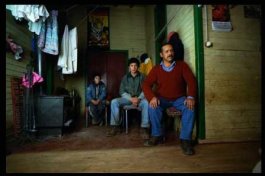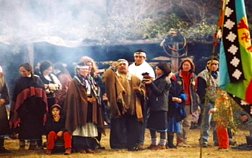Special 2-day Indigenous Voices Series: Mapuche NationJanuary 22 – 23, 2008
Day 1
Tuesday, January 22 @ 7PM – $5 SuggestedScreening: “Apaga y Vamonos (Switch Off)″ (Chile, 2005, 87 minutes)
 “Switch off” is a tale about a usurped nation, about a forgotten genocide, about globalization, about one river.The Biobío is one of the longest rivers in Chile, having its source in the Andes and flowing into the Pacific Ocean. This river has an enormous ecological value as well as a great historical and political value too. During the Spanish occupation the Biobío was a natural frontier against the enemy. From the Biobío down, the Spanish were unable to subjugate the original inhabitants, the Pehuenche-Mapuche indigenous peoples.
“Switch off” is a tale about a usurped nation, about a forgotten genocide, about globalization, about one river.The Biobío is one of the longest rivers in Chile, having its source in the Andes and flowing into the Pacific Ocean. This river has an enormous ecological value as well as a great historical and political value too. During the Spanish occupation the Biobío was a natural frontier against the enemy. From the Biobío down, the Spanish were unable to subjugate the original inhabitants, the Pehuenche-Mapuche indigenous peoples.
In 1997 the Spanish hydro-electric company ENDESA decided to build a dam in the Biobío River to form the Ralco hydroelectric power station. From the beginning, the Mapuches made their opposition clear, seeking protection under indigenous law. ENDESA, which up to that time was a public Spanish company, was privatized by the government of José María Aznar and became an ever increasing power, using their influence to move ahead with the dam. In May, 2004, the flooding of the Ralco valley started and 70 indigenous families were displaced and “invited to live in the high mountains” at a height of 2,000 meters. Although they have one of the world’s largest producer’s of electricity at their feet, they have been without electricity for over three years, using candles for lighting.
Mapuche spokespeople who have denounced the situation of their brothers have been persecuted and convicted by the Chilean courts, using anti-terrorist laws developed under Pinochet, although none have ever been found in possession of a firearm or other weapons. The basic proof used to convict these indigenous leaders were faceless witnesses, wearing hoods and speaking in distorted voices during the trails. Not even the defense lawyers know their identity.The UN Special Reporter, Mr. Rodolfo Stavenhagen, stated that there was a human rights violation in the construction of the Ralco hydro-electric power station in the Upper Biobío in the Andes. The ARCIS University in Chile described the scheme as genocide against the Pehuenche-Mapuche indigenous peoples.
More Reviews:“A classic confrontation between the weak and strong in which the strong, the impersonal forces of globalisation, will no be stopped” THE NEW YORK TIMES – JUNE 2006“One of the most well crafted movies is Manel Mayol’s ”Switch Off”. Alternating between powerful close-ups interwiews and mejestic landscapes of Chile‘s Ralco Valley” INDIEWIRE – NOVEMBER 2006
Day 2
Wednesday, January 23 @ 7PM – $5 SuggestedScreening: “Mapuche: The Return of a Nation″ (2005, 70 minutes)
 More than two thousand years of history are told in the 70 minutes of this film, which explores the distinctiveness of this South American native community. They are the narrators of this story and of this film, offering a close look into their identity and their intergenerational organization. The film also gives an insight into who Mapuches are, how they live and how they interrelate with nature.
More than two thousand years of history are told in the 70 minutes of this film, which explores the distinctiveness of this South American native community. They are the narrators of this story and of this film, offering a close look into their identity and their intergenerational organization. The film also gives an insight into who Mapuches are, how they live and how they interrelate with nature.
Combining different testimonies of members of the Mapuche community, observer participation and philosophical and political discussion, this film takes the viewer to the heart of the Mapuches, gives their own take on how they were invaded, their constant resistance against colonization, the way they still fight for their rights and their constant struggle for acknowledgment as a ‘nation’.
Through this film we learn how, through the Mapuches’ battle, an unprecedented debate is emerging within Argentinian society about citizenship and biodiversity; two different approaches to life, namely Native and Western principles; two schools of thought; of approaching history; of understanding the present and the future. In doing so, this film aims to unite the two ‘nations’ into a whole, new state, one that embraces intercultural citizenship.
Visit www.contrapicado.com.ar or email the filmmaker, Pablo Garcia, for more information.
Leave a comment
No comments yet.

Leave a comment